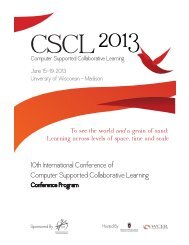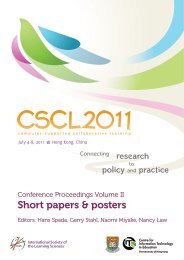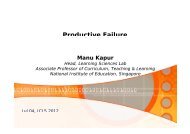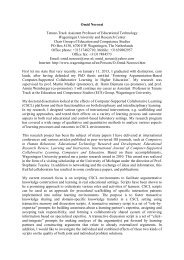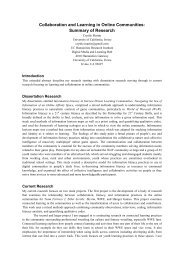Call for Participation - ISLS International Society of the Learning ...
Call for Participation - ISLS International Society of the Learning ...
Call for Participation - ISLS International Society of the Learning ...
Create successful ePaper yourself
Turn your PDF publications into a flip-book with our unique Google optimized e-Paper software.
Educational Game Design - Prototyping with purpose<br />
Organizers<br />
Matt Gaydos - University <strong>of</strong> Wisconsin-Madison, United States<br />
Kurt Squire - Center <strong>for</strong> Games, <strong>Learning</strong> & <strong>Society</strong>/University <strong>of</strong> Wisconsin-Madison, United States<br />
Dennis Ramirez - Center <strong>for</strong> Games, <strong>Learning</strong> & <strong>Society</strong>/University <strong>of</strong> Wisconsin-Madison, United States<br />
Ryan Martinez - University <strong>of</strong> Wisconsin-Madison, United States<br />
Clem Samson-Samuel - Center <strong>for</strong> Games, <strong>Learning</strong> & <strong>Society</strong>/University <strong>of</strong> Wisconsin-Madison, United States<br />
Contact Email Address<br />
gaydos@wisc.edu<br />
WORKSHOP CONTENT<br />
Research from different domains and <strong>the</strong>oretical perspectives has begun to invent new prosocial ways that games could be<br />
played. Scientific discovery games like Phylo and Fold It have improved scientists’ understanding <strong>of</strong> protein folding by<br />
leveraging <strong>the</strong> resources <strong>of</strong> large player communities to overcome computational limitations. Action video games,<br />
psychologists note, can be potentially useful <strong>for</strong> visual attention training (Dye, Green, & Bavelier 2012). In education<br />
research, video games and <strong>the</strong>ir player communities are being explored as models from which to design new learning<br />
environments. Good commercial games promote good learning, researchers argue, and many in-game and out-<strong>of</strong>-game<br />
practices have value in education contexts as well as video game contexts. From multiple disciplines, researchers are<br />
exploring new ways to leverage <strong>the</strong> af<strong>for</strong>dances <strong>of</strong> video games and <strong>the</strong> players that play <strong>the</strong>m.<br />
Inventing new games <strong>for</strong> research purposes poses significant design challenges, however, as such games require that game<br />
developers integrate particular and <strong>of</strong>ten expert-level content into a game’s design. In some games, this means leveraging<br />
already-existing genres and borrowing known mechanics or tropes. The educational game Virulent, <strong>for</strong> example, includes<br />
strategic elements <strong>of</strong> Starcraft and interface elements <strong>of</strong> Harbor Master. O<strong>the</strong>r research games have fewer prior models from<br />
which to work, however, and must invent much <strong>of</strong> <strong>the</strong> player experience on <strong>the</strong>ir own, as was <strong>the</strong> case with Fold It. Because<br />
cross-disciplinary work that incorporates elements <strong>of</strong> video game design with o<strong>the</strong>r areas <strong>of</strong> research has begun to show<br />
promise, methods that accelerate this process warrant fur<strong>the</strong>r attention.<br />
Game jams are design sessions that challenge participants to create a playable game that adheres to a particular <strong>the</strong>me within<br />
a limited amount <strong>of</strong> time. Often ranging from an hour to a week, game jams and o<strong>the</strong>r similarly constrained design events<br />
<strong>of</strong>fer one method <strong>for</strong> prompting collaborative work between participants by way <strong>of</strong> a low-cost, prototype-focused practice that<br />
is growing in popularity amongst commercial game developers. Especially <strong>for</strong> students and independent developers, game<br />
jams have been used to push <strong>the</strong> boundaries <strong>of</strong> <strong>the</strong> medium (e.g., <strong>the</strong> Independent Game Jam), and to introduce design<br />
students to producing a game (e.g., <strong>the</strong> Global Game Jam). Similar to design-based research, jams embrace <strong>the</strong> inherently<br />
messy process <strong>of</strong> moving between a design and its use in context, orienting participants towards rapid prototype production<br />
and iteration, both <strong>of</strong> which are hallmarks <strong>of</strong> good design (Hoadley, 2002). When using non-digital media (paper, pencils),<br />
jams can be especially useful <strong>for</strong> students and content experts without programming backgrounds.<br />
In this workshop, participants will take part in and learn to run <strong>the</strong>ir own game jams. The workshop will begin with a brief<br />
introduction to rapid game prototyping and its use in <strong>the</strong> commercial development followed by an hour-long game design jam<br />
during which participants will create a playable game prototype. After <strong>the</strong> jam is complete, participants will briefly review<br />
o<strong>the</strong>r games created during <strong>the</strong> session and will reflect on <strong>the</strong> overall process. Workshop administrators will present a brief<br />
series <strong>of</strong> cases <strong>for</strong> game jam use and <strong>the</strong>n open <strong>the</strong> floor to discussion, focusing on o<strong>the</strong>r ways to use or modify rapid design<br />
and prototyping to fur<strong>the</strong>r <strong>the</strong>ir own research or development goals and problems <strong>the</strong>y have previously encountered or<br />
anticipate having. The goal <strong>of</strong> <strong>the</strong> workshop is to 1) gain a better understanding <strong>of</strong> how to conduct rapid game prototyping<br />
events (e.g., game jams) and 2) advance <strong>the</strong> discussion around how games can be leveraged and integrated into educational<br />
environments. For more on <strong>the</strong> details <strong>of</strong> <strong>the</strong> event, visit http://www.gameslearningsociety.org/educational-game-design/.<br />
PARTICPATION PROCEDURE<br />
This tutorial is <strong>for</strong> researchers and developers interested in studying game design, developing games <strong>for</strong> learning, or<br />
using design as a springboard to o<strong>the</strong>r phenomena (e.g. Computer programming). Interested participants should submit
<strong>the</strong> following (max 1 page):<br />
Name and pr<strong>of</strong>essional affiliation<br />
Game design experience (please be specific)<br />
Experience using game design in learning contexts and outcome<br />
Experience working with game design jams<br />
One to two paragraphs explaining why you want to take <strong>the</strong> workshop and your expected goals at <strong>the</strong> end <strong>of</strong><br />
<strong>the</strong> workshop<br />
Participants should have some experience with or understanding <strong>of</strong> interactive or design activities, ideally using<br />
technology and/or games <strong>for</strong> education. Researchers who are already running development jams are invited to<br />
participate, but a mix <strong>of</strong> experienced and inexperienced participants will be selected.<br />
IMPORTANT DATES<br />
Paper submission deadline April 1st (to mat<strong>the</strong>w.gaydos@gmail.com)<br />
Acceptance notification May 1st<br />
Workshop Date June 16th



